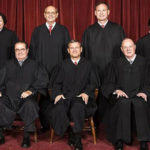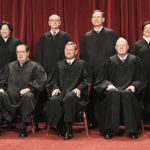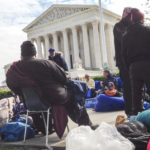SAN FRANCISCO (ABP)— California Supreme Court justices overturned a statewide ban on same-sex marriages.
The decision paves the way for the Golden State to become the second jurisdiction in the union with fully legalized gay marriage. However, it likely will have little effect, legally speaking, on same-sex couples in the state, which already offers such couples domestic partnerships with rights and obligations virtually identical to those provided by marriage.
Nonetheless, the court’s majority decided that denying the use of the term “marriage” to such couples violates their rights under the state’s charter.
“The question we must address is whether, under these circumstances, the failure to designate the official relationship of same-sex couples as marriage violates the California Constitution,” said the court’s majority opinion, written by Chief Justice Ronald George.
Interracial marriage ban struck down in 1948
The majority referred to the court’s historic 1948 Perez v. Sharp ruling, which similarly said a California ban on interracial marriage violated the state constitution’s equal-protection provisions—even though such a ban had existed since California’s founding.
It was the first state high court in the United States to issue a ruling on interracial marriage, and it predated by nearly two decades the U.S. Supreme Court’s 1967 Loving v. Virginia decision overturning such anti-miscegenation laws nationwide.
The Perez decision, the current California court’s majority said, “makes clear that history alone is not invariably an appropriate guide for determining the meaning and scope of this fundamental constitutional guarantee. The decision in Perez, although rendered by a deeply divided court, is a judicial opinion whose legitimacy and constitutional soundness are by now universally recognized.”
The ruling overturns a 2000 statewide ballot initiative, called Proposition 22 , that defined marriage exclusively in heterosexual terms. It passed with 61 percent of the vote. But recent polls have suggested opinions are quickly changing in favor of gay marriage in California.
Sign up for our weekly edition and get all our headlines in your inbox on Thursdays
Justice Marvin Baxter, in a dissenting opinion, said the court’s majority was not justified in overruling the proposition.
“Nothing in our Constitution, express or implicit, compels the majority’s startling conclusion that the age-old understanding of marriage—an understanding recently confirmed by an initiative law—is no longer valid,” he wrote. “California statutes already recognize same-sex unions and grant them all the substantive legal rights this state can bestow. If there is to be a further sea change in the social and legal understanding of marriage itself, that evolution should occur by similar democratic means.”
San Francisco 2004 gay marriages
The case stemmed from 2004, when San Francisco Mayor Gavin Newsom and other city officials began performing same-sex marriages despite the Proposition 22 ban. Hundreds of couples were wed before the California Supreme Court stepped in to halt the marriages.
The justices, six appointed by Republican governors, found that Newsom had overstepped his authority. They put a halt to the marriages, invalidating the ones that already had taken place.
Gay couples married under his edict sued, first challenging the state law banning same-sex marriage, then challenging the new state law that created domestic partnerships. They were joined by gay-rights and civil-liberties groups. The court consolidated several cases that dealt with the constitutionality of the two-tiered scheme of marriage and domestic partnership.
Conservative groups in the state have vowed to push harder for an amendment that is likely to appear on the November ballot to reinstitute the marriage ban. Since it would be a constitutional amendment, it would invalidate the court’s ruling.
“The voters realize that defining marriage as one man and one woman is important because the government should not, by design, deny a child both a mother and father,” said a statement from Glen Lavy, a senior counsel for the conservative Alliance Defense Fund, who argued the case before the court.
Marriage "not safe from tampering"
“The court’s decision clearly demonstrates that marriage is not ultimately safe from tampering by activists and others in government until the voters have amended the constitution.”
The organization will ask the court to stay their decision—slated to take effect in a month —until after the election.
But Gov. Arnold Schwarzenegger (R), who vetoed legislative attempts to legalize same-sex marriage twice in as many years, said May 15 he would uphold and enforce the latest decision. He has previously said he would oppose the proposed constitutional amendment to ban gay marriage permanently.
The case is City and County of San Francisco v. California.















We seek to connect God’s story and God’s people around the world. To learn more about God’s story, click here.
Send comments and feedback to Eric Black, our editor. For comments to be published, please specify “letter to the editor.” Maximum length for publication is 300 words.